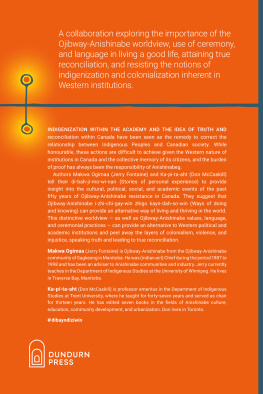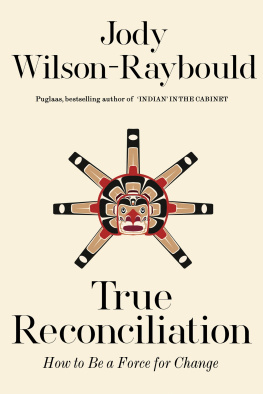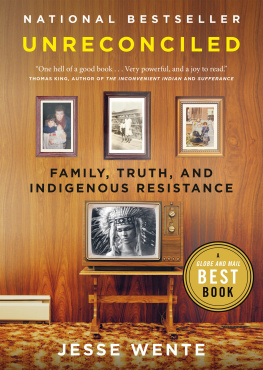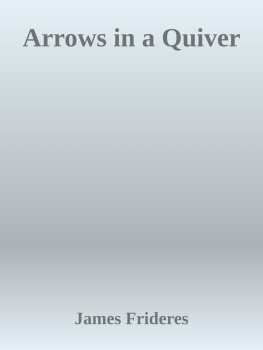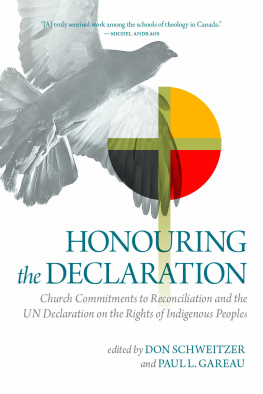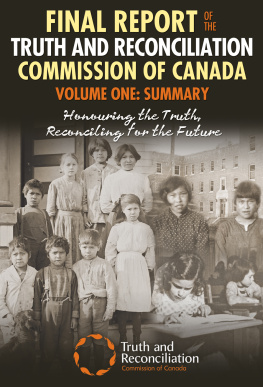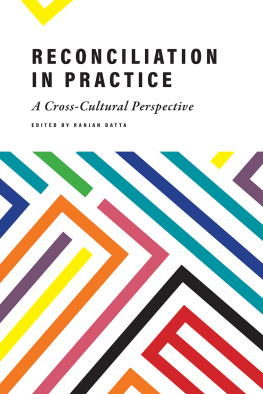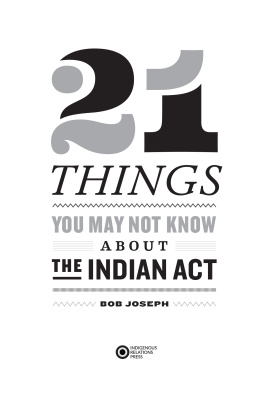Contents
Guide
PRAISE FORDI-BAYN-DI-ZI-WIN
Mitik Anabaa ndi-zhi-ni-kawz, Makwa doodem zhigo Sagkeen doon-ji (My name is Spirit Tree, Im Bear Clan from Where the River Widens).
It is both a teachable moment and a holistic confirmation of thousands of years of our presence and responsibilities in and to this continent. Why we introduce ourselves as we do is tied to the Ojibway phrase Anishinabe i-zhi-chi-gay-win zhigo kayndah-so-win (commonly translated as Our ways of doing and knowing), and it truly is a beautiful ceremony in its simplicity and complexity that shows respect for our ancestors, for the land, and for the listener.
The concurrent acts of learning and teaching are in and of themselves ceremony, and their transference crosses race, nation, and religion. While we cannot coerce learning nor impose our will academically, we can create space, as envisioned by my nephew Makwa Ogimaa, that reconciles the Anishinabeg learning/teaching paradigm with the standard processes brought here from elsewhere.
The creation of spaces to learn and teach emanating from the first languages of the continent, from our worldview, and from our knowledge sets a true path to reconciliation. Education with our hand on the wheel is the vehicle that will bring truth to our histories and presence in our continent and enlighten a new generation of academics. Without an enlightened population, Indigenous Peoples will continue to be shackled by the intransigence of ill-informed government policy and political parties and their bases, who diminish our presence and identities to quaint historical curiosities, easily dismissed or ignored.
The work that will take us towards the equitable and respectful mutual co-existence that our ancestors envisioned with each treaty signed to share land and resources includes this book and others to come. I remain, as always, hopeful in the future yet mindful that there is much hard work yet to do.
It is an honour and privilege to walk this path with my nephew, Makwa Ogimaa.
Meegwetch.
Phil Fontaine, Sagkeeng
This is the time for this book. We need to read it.
Di-bayn-di-zi-win shows why Indigenous ways are so pertinent today. It describes with precision and courage the limitations of the long struggles that have been waged in Canada to treat Indigenous Peoples hospitably and with respect in the academy. What has been most difficult, what has not been achieved, is to recognize the radical otherness of the other and to open heads, hearts, and hands to their autonomous existence. The book examines and discusses what their presence in the academy has meant, their compromises and achievements within the dominant system. Despite important advances, the agreement badly needed does not seem possible. It requires a profound transformation of the people and their institutions, which is not in sight due to inertias in both.
This book can be a source of inspiration to take a new path, in and out of academia, for both Indigenous and non-Indigenous people.
Gustavo Esteva, Universidad de la Tierra en Oaxaca
There are multiple ways to inhabit our deepest principles. There are also many ways to honour land and our Elders by embodying the teachings of both. Here is life found in kindness, loving, and truth. How do we access healing and how do we share this healing with others? Reading this book is one way. Tears of gratitude for you both, Jerry Fontaine and Don McCaskill. Mahalo nui no ko ike nahenahe. Thank you for this mutual emergence shaped as much by friendship as it is by ike kupuna Elder knowledge. What is within these pages are ceremonial gifts offered to all who will take the time to connect with what is inevitable about our collective evolution.
Manulani Aluli Meyer, University of Hawaii
Thank you for sending me Di-bayn-di-zi-win. I love it not just because it connects with my own critical views of the Academy but more because you write in a way our own Indigenous people can understand and feel; your passion is tangible. I, too, have argued against the notion indigenization (which has seemed to be the institutional go-to answer following the recommendations of the Royal Commission inquiry to residential schools). Indigenization is what I refer to as self-esteem theory you add a dash of Indigenous culture here and there as a decoration for the white institution, and in the end our culture simply acts as a tokenistic additive element; a sugar-coated candy to help the same old colonizing pills to go down!
Its great that your way of writing is very accessible to our communities these messages must be for ourselves first and foremost in that a much-neglected area in our struggle is the reclaiming of our minds our own imaginations. This is also why I am critical of the concept of decolonization, in that it puts the colonizer at the centre of the discussion. I prefer, as you are also arguing, to speak to the issues of resistance, self-determining struggle, and the prior concern to transform ourselves.
Di-bayn-di-zi-win will be useful for our people here in New Zealand and many of the indigenous jurisdictions I have worked with across the world.
Graham Hingangaroa Smith, Distinguished Professor, Massey University, New Zealand
DI-BAYN-DI-ZI-WIN
TO OWN OURSELVES
Jerry Fontaine & Don McCaskill
DI-BAYN-DI-ZI-WIN
TO OWN OURSELVES
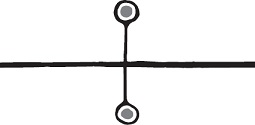
EMBODYING OJIBWAY-ANISHINABE WAYS

Copyright Jerry Fontaine and Don McCaskill, 2022
All rights reserved. No part of this publication may be reproduced, stored in a retrieval system, or transmitted in any form or by any means, electronic, mechanical, photocopying, recording, or otherwise (except for brief passages for purpose of review) without the prior permission of Dundurn Press. Permission to photocopy should be requested from Access Copyright.
Publisher and acquiring editor: Scott Fraser | Editor: Rhonda Kronyk
Cover designer and illustrator: Mariah Meawasige
Library and Archives Canada Cataloguing in Publication
Title: Di-bayn-di-zi-win : to own ourselves : embodying Ojibway-Anishinabe ways / Jerry Fontaine & Don McCaskill.
Names: Fontaine, Jerry, 1955- author. | McCaskill, Don N., author.
Description: Includes bibliographical references and index.
Identifiers: Canadiana (print) 20210339306 | Canadiana (ebook) 20210339888 | ISBN 9781459748996 (softcover) | ISBN 9781459749009 (PDF) | ISBN 9781459749016 (EPUB)
Subjects: LCSH: CanadaRace relations. | LCSH: CanadaEthnic relations. | LCSH: ReconciliationCanada. | LCSH: DecolonizationCanada. | CSH: First NationsCanadaSocial life and customs. | CSH: First NationsCanadaEthnic identity. | CSH: First NationsCanadaPolitics and government.
Classification: LCC E99.C6 F66 2022 | DDC 305.897/333071dc23

We acknowledge the support of the Canada Council for the Arts and the Ontario Arts Council for our publishing program. We also acknowledge the financial support of the Government of Ontario, through the Ontario Book Publishing Tax Credit and Ontario Creates, and the Government of Canada.
Care has been taken to trace the ownership of copyright material used in this book. The author and the publisher welcome any information enabling them to rectify any references or credits in subsequent editions.

